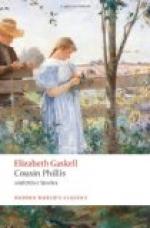‘Phillis!’ I cried, going towards her, with my hand out, to take hers for sympathy with her sorrow, whatever it was. But she was too quick for me, she held her hand out of my grasp, for fear of my detaining her; as she quickly passed out of the house, she said,—
‘Don’t, Paul! I cannot bear it!’ and passed me, still sobbing, and went out into the keen, open air.
I stood still and wondered. What could have come to Phillis? The most perfect harmony prevailed in the family, and Phillis especially, good and gentle as she was, was so beloved that if they had found out that her finger ached, it would have cast a shadow over their hearts. Had I done anything to vex her? No: she was crying before I came in. I went to look at her book—one of those unintelligible Italian books. I could make neither head nor tail of it. I saw some pencil-notes on the margin, in Holdsworth’s handwriting.
Could that be it? Could that be the cause of her white looks, her weary eyes, her wasted figure, her struggling sobs? This idea came upon me like a flash of lightning on a dark night, making all things so clear we cannot forget them afterwards when the gloomy obscurity returns. I was still standing with the book in my hand when I heard cousin Holman’s footsteps on the stairs, and as I did not wish to speak to her just then, I followed Phillis’s example, and rushed out of the house. The snow was lying on the ground; I could track her feet by the marks they had made; I could see where Rover had joined her. I followed on till I came to a great stack of wood in the orchard—it was built up against the back wall of the outbuildings,—and I recollected then how Phillis had told me, that first




